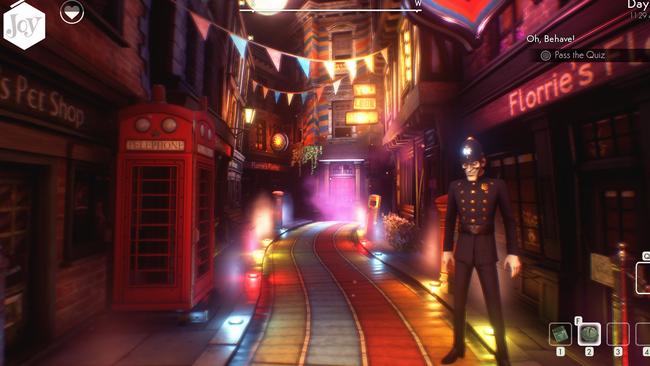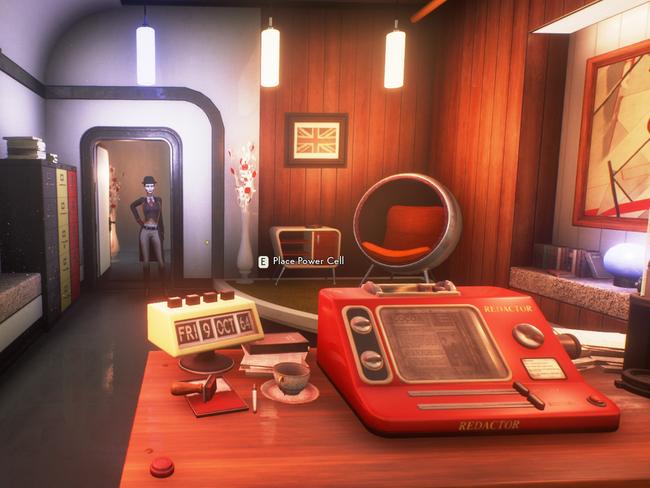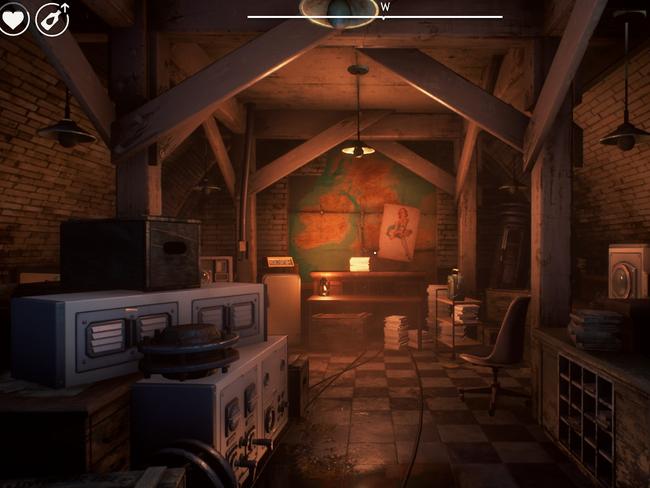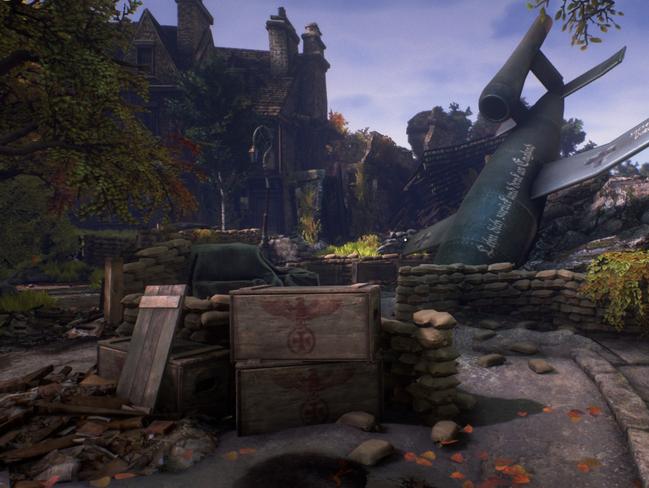What would a psychadellic post-war Britain look like?
The worst crime you can commit in this trippy post-war dystopian game is to be labelled a ‘Downer’. So keep that happy mask on … or else.

Game Reviews
Don't miss out on the headlines from Game Reviews. Followed categories will be added to My News.
WHEN we imagine a world in which Britain lost World War II, we tend to think of something like The Man In The High Castle or SS-GB; a drab, fascist dystopia where everything is depressing and bleak.
But what if that world was actually a groovy, happy, trippy sort of place — where everyone had to be groovy, happy and trippy all the time … or else?
Welcome to the setting of We Happy Few, developed by Compulsion Games and published by
Gearbox on PC, PlayStation 4 and Xbox One.
Best described as what you’d get if Douglas Adams and Sir Terry Pratchett created a cross
between The Prisoner, Austin Powers, Fallout and 1984, We Happy Few is set in the fictional
city of Wellington Wells in 1964 and casts you as three characters — Arthur Hastings, a censor at the Ministry of Archives looking for his missing brother; Sally Boyle, a chemist (nudge, nudge, wink, wink) with a secret of her own; and Ollie Starkey, a soldier who has had enough and wants to escape the city — and his past.

It turns out that after the Germans occupied Britain at the end of the war, they took all the
children under 13 back to Germany as hostages while the Germans kept fighting against the
Soviet Union — and none of the children were ever heard from again.
In the aftermath of this event, the citizens of Wellington Wells (the town the game is set in) have decided to forget their past by spending all their time stoned out of their gourds on happy pills and literally wearing a happy face.
People are required to take the drug “Joy” and wear their happy face masks at all times in public.
One of the worst crimes a citizen can commit is being labelled a “Downer” by going off Joy and generally not buying into the “everyone is awesome and groovy” mantra the government mandates — even when it’s obvious there’s no food, disease is spreading, and the birthrate has
plummeted to almost zero.
Those caught off their Joy get a first-hand experience of the violence inherent in the system as
they’re beaten to death by everyone nearby.

The game itself is a survival RPG, in that you have to eat, drink, craft tools and medicine, and generally deal with the threats the world poses as you complete quests.
Some ingredients (like clean, unspiked water) are only found in “The Garden District”, while others can be found only by dismantling objects in the city — and the locals don’t like you doing anything that’s even slightly suss.
Arthur Hastings is a brilliant and expertly-realised protagonist, being perhaps the most
quintessentially English main character since Arthur Dent donned his dressing gown and picked up a towel in The Hitch-Hiker’s Guide To The Galaxy.
Indeed, the game’s wry English humour and general Englishness is superb as well — and yes,
there are even Monty Python references in the game, along with other pop culture nods —
somehow Mortal Kombat even gets in there.
The voice acting for the main characters is really good and Canadian actor Julian Casey deserves acknowledgment for his superb performance as “Uncle Jack”, the propaganda face of the government — a constant figure on TV screens throughout the game providing increasingly ridiculous or unhelpful advice to the populace of Wellington Wells and districts.
The game isn’t without its issues, sadly.
Most are graphical glitches and things like characters sitting in mid-air above desks.
But I did encounter issues where people would be hostile for no reason (even in the game’s already twitchy setting), or where people would completely ignore my character even when I definitely wasn’t supposed to be where I was.
One of the big issues is that, having finished Arthur’s story — which took about 20 hours — I discovered that there was still Sally’s story and then Ollie’s after that.
There wasn’t much of an indication that this was coming in-game, so once I reached what I thought was the end of the story, suddenly being presented with even more game (much more) ahead of me wasn’t as much of a pleasant surprise as one might think.
Combat isn’t nearly as varied as the tutorial section implies — it’s basically swinging a variety of objects at people until they decide to lie down for a bit — or forever, depending how hard you hit them.
Turning and running away is usually your best option.

At time of writing, the game is retailing on the Microsoft Store for Xbox One at $99.95, which is far too high. It’s a good game, but it’s not $100 good — especially since most AAA games these days are around the $70-$80 mark.
I remain absolutely baffled by the classification board’s initial decision to refuse this game
classification due to drug use — Joy is clearly fictional, and it has serious side effects including messing with your character’s memory.
Playing the release game just confirmed what I thought at E3: There is nothing the average person — particularly one who plays video games — would find even remotely objectionable in it.
The classification review board’s decision to grant We Happy Few classification (R18+) was the right one, and hopefully it furthers discussion on mature content in video games and how the medium can further its potential for telling grown-up stories.
We Happy Few has a lot to say, though, and generally does it well; the story runs deeper than
“Be happy or else!” and there’s some thought-provoking stuff in it about propaganda, the nature of reality, and whether you really can hide from your past.
While not without its issues, We Happy Few is something very different — and if you’re a fan of British humour such as found in the Discworld or Hitch-Hiker’s Guide books, then it’s
absolutely worth playing once it goes on sale or shows up on one of the game subscription
services.
Continue the conversation about all things gaming — including We Happy Few — on Twitter:
@RoyceWilsonAU
Originally published as What would a psychadellic post-war Britain look like?
